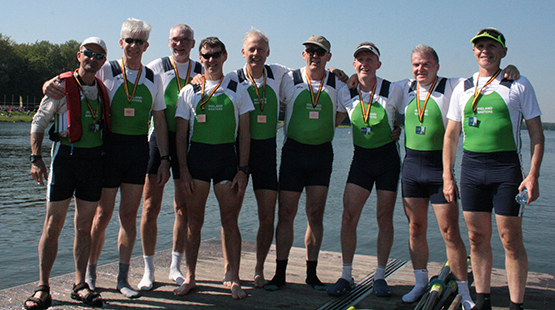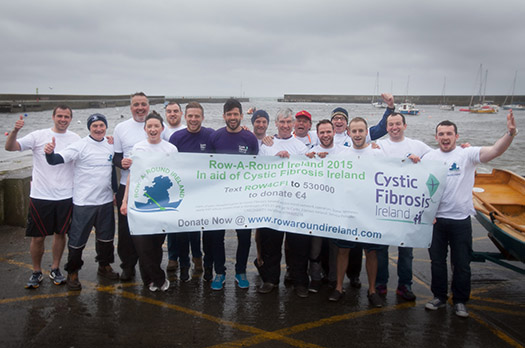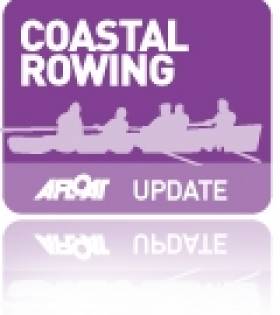Displaying items by tag: Crowley
Big Welcome Home for Row-A-Round Ireland Team
A crew of 20 rowers who set off to circumnavigate the island of Ireland – a round trip of almost 1000 nautical miles – in a self-built 15ft skiff to raise funds for Cystic Fibrosis Ireland (CFI) have today arrived home after a challenging four months at sea.
The team, comprising 20 rowers of mixed ability and experience, set off from Bray, Co. Wicklow on May 30th with crews of two oarsmen/women at a time rowing in relays. The rowers stopped at over 50 designated points along the coast before arriving home to a warm welcome from friends and family and members of the Bray community.
‘Row-A-Round Ireland’ is the brainchild of Bray-based maritime enthusiast Ger Crowley, who says the success of the trip was down to the dedicated crew of rowers and volunteers and the communities who came out to support the Row-A-Round Ireland team nationwide.
“It’s was an ambitious project, a journey of almost 1000 nautical miles, but I am delighted to say we have arrived home today after completing the challenge safely. I’d like to take this time to thank each and every individual who provided support to this challenge whether it was by offering accommodation or providing invaluable local knowledge – we couldn’t have done it without the Irish people doing what they do best,” Crowley said.
“The other objective, of course, was to raise funds and awareness for Cystic Fibrosis Ireland. At the start of this initiative, we all decided upon a target we would like to hit, and while we have raised a huge amount so far, we are going to give it one last push over the next few weeks to hit that top note,” he said.
Their arrival was met with celebrations as the crew enjoyed a welcome home party on Bray Beach and Harbour with refreshments from Row-A-Round Ireland sponsor, Lyons Tea.
The team heavily relied on local community support along the way, with many members of the maritime community including rowing, sailing and diving clubs around the country providing support by offering food, accommodation as well as valuable advice and local knowledge.
Funds have been made as the boat rowed around the county, with all money going towards fighting Cystic Fibrosis, a fatal genetic disease that affects approximately one in 1600 births in Ireland, the country with the highest incidence of CF in the developed world.
To donate to Cystic Fibrosis Ireland simply text ROW4CF to 50300 to donate €4 or to get in touch with the crew in relation to the challenge visit www.rowaroundireland.com.
Impressive Set of Wins By Irish at World Masters Regatta
#rowingworldmasters – Ireland had an impressive set of wins at the World Masters Regatta, the four-day event which finished today in Hazewinkel in Belgium. There was a notable win in the men’s eight in the E category (average age 55 or more) where the Irish crew beat one of Russia’s best clubs, Dynamo Moscow, by less than a canvas - .31 of a second. The strokeman of the Russian crew, Vitali Eliseev, stroked the World Championship-winning four in 1981. The Irish crew was a composite of Old Collegians, Belfast Boat Club, Neptune, Waterford and Commercial. Denis Crowley – who was in the eight – won single sculls races in three different age categories.

The Irish composite which beat Dynamo Moscow at the World Masters Regatta
World Masters Rowing Regatta, Hazewinkel, Belgium (Ireland Wins):
Men – Eight, E (Average 55 yrs or more): Old Collegians, Belfast BC, Neptune, Waterford, Commercial (John Hudson, Denis Crowley, Gerard Murphy, Michael Heavey, Colin Dickson, Colin Hunter, Francis O’Toole, Donal McGuinness, Al Penkert) 3 min 11.13 (1,000m)
Four, coxed, E (Average 55 yrs or more): Commercial, Belfast, Old Collegians, Waterford. Pair, E: Belfast BC. Pair, D (Avg 50+): Commercial. Pair, F (Avg 60+): Cappoquin.
Sculling – Double, F (Avg 60+): Carlow, Athlone. Single: B (36+), C (43+) and D (50+): Commercial (D Crowley). C (43+): Galway RC (S Heaney).
Women – Sculling, Single, A (27+): Three Castles (B Quinn).
Coastal Rowers Take on the Whole of Ireland
A team of 20 rowers have been circumnavigating the island of Ireland in a small, self-built skiff to raise funds for Cystic Fibrosis Ireland (CFI). Their plan for today (Thursday) is row up the Co Down coast to Blackhead, and then on to Portavogie.
The rowers, of mixed ability and experience, set off from Bray, Co. Wicklow on May 30th with crews of two oarsmen/women at a time rowing in relays. The rowers have planned stops at 50 designated points along the coast, with support on hand from a shore-based crew as well as cover boats that will escort the boat on some of the more challenging legs.
The team is particularly thankful for the support of local people, and some rowers can join the crew along the way.
‘Row-A-Round Ireland’ is the brainchild of Bray-based maritime enthusiast Ger Crowley, who said the trip was a huge challenge for all involved.
“It’s an ambitious project, a journey of almost 1,000 nautical miles, and the main objective is to safely row an open 15ft timber skiff around the island,” Crowley said. “Each two-person crew will contribute 100 miles towards the overall voyage over a period of a week or so, rowing on average up to 20 miles per day, so it’s a big ask for all our volunteers.
“The other objective, of course, is to raise funds and awareness for Cystic Fibrosis Ireland and all our rowers are giving their time and effort for free,” he says.
The Row-A-Round Ireland crew is drawn mainly from the immediate Crowley family and friends, under the watchful eye of team mascot and coxswain Joey the labrador. A true sea dog, Joey has a regular spot in the stern of the boat as it makes its way up and down the Bray coast on training rows. Although the journey will consist of 50 one-day legs, the changeable Irish weather means the crew has allowed 120 days to complete the challenge safely.

“Weather is going to be an issue alright, and there are some treacherous stretches of water to be navigated including Donegal Bay which comprises some 30 miles of the open Atlantic Ocean, Clew Bay, the Cliffs of Moher and from Loop Head across the mouth of the mighty Shannon,” says Ger Crowley, who built the boat.
The challenge also involves shore-based logistical support with a vehicle following the crew on land bringing change-over crews to intended landing areas, spares for repairs, food and also serving as a retrieval vehicle here beach landings are involved.
The team is also counting on local community support along the way, with many members of the maritime community including rowing, sailing and diving clubs around the country having pledged their support by offering food, accommodation as well as valuable advice and local knowledge.
Funds will be raised as the boat makes its way around Ireland, with all money going towards fighting Cystic Fibrosis, a fatal genetic disease that affects approximately 1 in 1600 births in Ireland, the country with the highest incidence of CF in the developed world.





























































